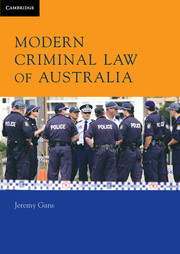11 - Victims
Summary
Introduction
Chapter 2 (Choices) set out the central role of people in Australia’s criminal justice system. Police, prosecutors, judges and some regulators are active players in determinations of criminal responsibility and the imposition of criminal punishment, and even defendants can play a key role in the course of their proceedings. By contrast, victims’ traditional roles in criminal justice are passive: to be an element of the charged offence and to be a witness (or even an exhibit) at the defendant’s trial.
In recent decades, victims (or, at least, groups claiming to represent victims’ interests) have emerged as a major political force, prompting changes to both offence definitions and official procedures. As was the case with Chapter 2, this chapter does not comprehensively examine the contemporary position of victims in the criminal justice system, but rather analyses the way that choices made by and about victims can affect the boundaries of offence provisions.
- Type
- Chapter
- Information
- Modern Criminal Law of Australia , pp. 314 - 343Publisher: Cambridge University PressPrint publication year: 2011



